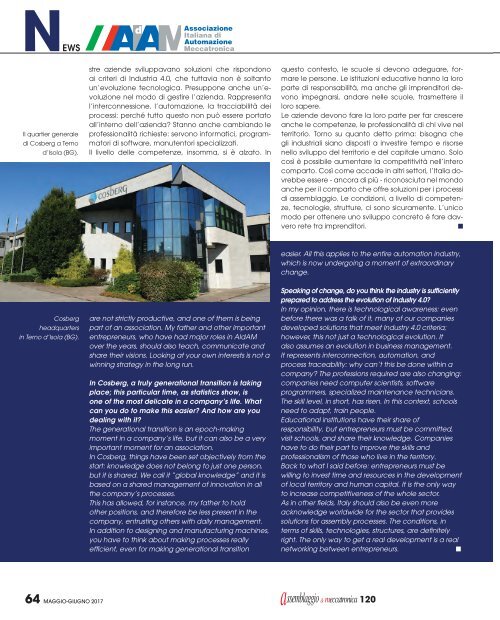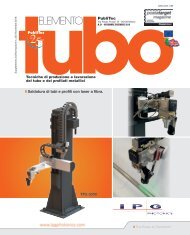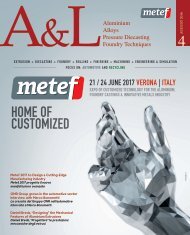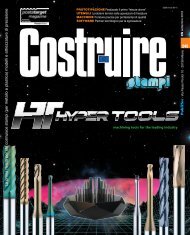AsseMec120_MAGGIU_2017
Create successful ePaper yourself
Turn your PDF publications into a flip-book with our unique Google optimized e-Paper software.
NEWS<br />
Associazione<br />
Italiana di<br />
Automazione<br />
Meccatronica<br />
Il quartier generale<br />
di Cosberg a Terno<br />
d’Isola (BG).<br />
stre aziende sviluppavano soluzioni che rispondono<br />
ai criteri di Industria 4.0, che tuttavia non è soltanto<br />
un’evoluzione tecnologica. Presuppone anche un’evoluzione<br />
nel modo di gestire l’azienda. Rappresenta<br />
l’interconnessione, l’automazione, la tracciabilità dei<br />
processi: perché tutto questo non può essere portato<br />
all’interno dell’azienda? Stanno anche cambiando le<br />
professionalità richieste: servono informatici, programmatori<br />
di software, manutentori specializzati.<br />
Il livello delle competenze, insomma, si è alzato. In<br />
questo contesto, le scuole si devono adeguare, formare<br />
le persone. Le istituzioni educative hanno la loro<br />
parte di responsabilità, ma anche gli imprenditori devono<br />
impegnarsi, andare nelle scuole, trasmettere il<br />
loro sapere.<br />
Le aziende devono fare la loro parte per far crescere<br />
anche le competenze, le professionalità di chi vive nel<br />
territorio. Torno su quanto detto prima: bisogna che<br />
gli industriali siano disposti a investire tempo e risorse<br />
nello sviluppo del territorio e del capitale umano. Solo<br />
così è possibile aumentare la competitività nell’intero<br />
comparto. Così come accade in altri settori, l’Italia dovrebbe<br />
essere - ancora di più - riconosciuta nel mondo<br />
anche per il comparto che offre soluzioni per i processi<br />
di assemblaggio. Le condizioni, a livello di competenze,<br />
tecnologie, strutture, ci sono sicuramente. L’unico<br />
modo per ottenere uno sviluppo concreto è fare davvero<br />
rete tra imprenditori.<br />
n<br />
Cosberg<br />
headquarters<br />
in Terno d’Isola (BG).<br />
are not strictly productive, and one of them is being<br />
part of an association. My father and other important<br />
entrepreneurs, who have had major roles in AIdAM<br />
over the years, should also teach, communicate and<br />
share their visions. Looking at your own interests is not a<br />
winning strategy in the long run.<br />
In Cosberg, a truly generational transition is taking<br />
place; this particular time, as statistics show, is<br />
one of the most delicate in a company’s life. What<br />
can you do to make this easier? And how are you<br />
dealing with it?<br />
The generational transition is an epoch-making<br />
moment in a company’s life, but it can also be a very<br />
important moment for an association.<br />
In Cosberg, things have been set objectively from the<br />
start: knowledge does not belong to just one person,<br />
but it is shared. We call it “global knowledge” and it is<br />
based on a shared management of innovation in all<br />
the company’s processes.<br />
This has allowed, for instance, my father to hold<br />
other positions, and therefore be less present in the<br />
company, entrusting others with daily management.<br />
In addition to designing and manufacturing machines,<br />
you have to think about making processes really<br />
efficient, even for making generational transition<br />
easier. All this applies to the entire automation industry,<br />
which is now undergoing a moment of extraordinary<br />
change.<br />
Speaking of change, do you think the industry is sufficiently<br />
prepared to address the evolution of Industry 4.0?<br />
In my opinion, there is technological awareness: even<br />
before there was a talk of it, many of our companies<br />
developed solutions that meet Industry 4.0 criteria;<br />
however, this not just a technological evolution. It<br />
also assumes an evolution in business management.<br />
It represents interconnection, automation, and<br />
process traceability: why can’t this be done within a<br />
company? The professions required are also changing:<br />
companies need computer scientists, software<br />
programmers, specialized maintenance technicians.<br />
The skill level, in short, has risen. In this context, schools<br />
need to adapt, train people.<br />
Educational institutions have their share of<br />
responsibility, but entrepreneurs must be committed,<br />
visit schools, and share their knowledge. Companies<br />
have to do their part to improve the skills and<br />
professionalism of those who live in the territory.<br />
Back to what I said before: entrepreneurs must be<br />
willing to invest time and resources in the development<br />
of local territory and human capital. It is the only way<br />
to increase competitiveness of the whole sector.<br />
As in other fields, Italy should also be even more<br />
acknowledge worldwide for the sector that provides<br />
solutions for assembly processes. The conditions, in<br />
terms of skills, technologies, structures, are definitely<br />
right. The only way to get a real development is a real<br />
networking between entrepreneurs.<br />
n<br />
64 MAGGIO-GIUGNO <strong>2017</strong> & meccatronica 120





